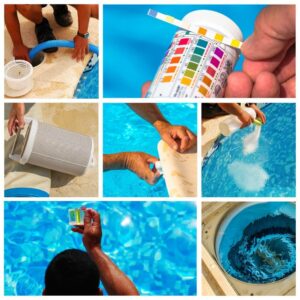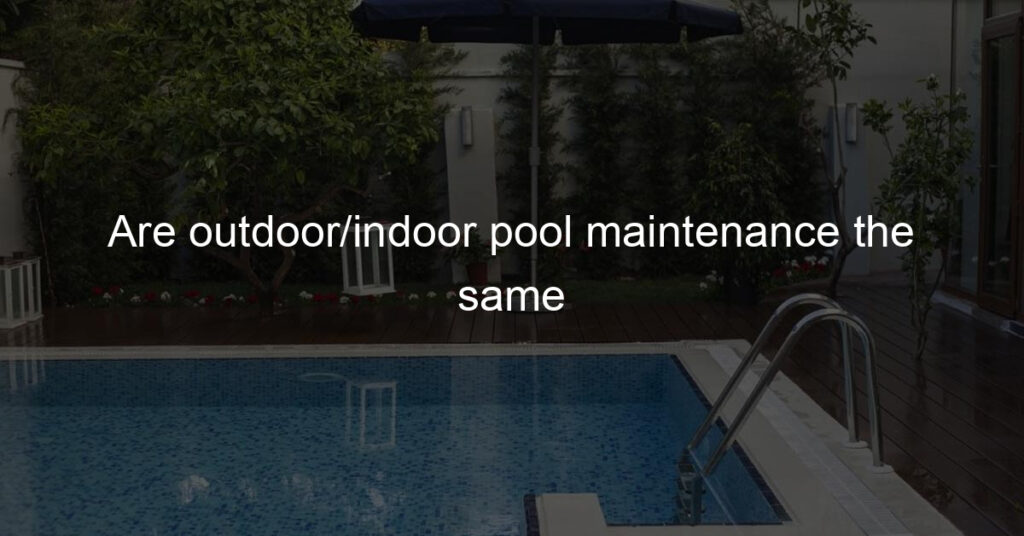Understanding Pool Maintenance: The Basics
Regardless of their location, all swimming pools require routine maintenance to ensure their cleanliness, safety, and functionality. Standard tasks typically include skimming the pool’s surface to remove debris, vacuuming to clean the bottom, brushing the walls, checking water quality and balancing chemicals, maintaining equipment, and regularly inspecting the pool for potential damage or leaks.
The Unique Challenges of Outdoor Pool Maintenance
Outdoor pools are exposed to the elements, which introduces unique maintenance challenges. Falling leaves, dirt, pollen, insects, and even wildlife can end up in the pool, necessitating more frequent skimming and vacuuming. Weather conditions like rain or wind can affect the pool’s chemical balance, requiring more frequent testing and adjustments.
Cleaning Procedures for Outdoor Pools
To keep an outdoor pool clean, it’s crucial to skim the surface daily, vacuum at least once a week, and brush the pool walls and floor regularly to prevent algae buildup. The pool filter also needs routine cleaning, as it can quickly become clogged with debris. Pool covers can be used to minimize the amount of debris entering the pool when not in use.
Water Quality and Chemical Balance in Outdoor Pools
Maintaining the correct water chemistry in an outdoor pool can be challenging due to environmental factors. Regular testing is necessary to keep pH, alkalinity, and sanitizer levels balanced. The pool’s chlorine levels can also be affected by sunlight, requiring the use of stabilizers to prevent rapid chlorine depletion.
Equipment Maintenance for Outdoor Pools
Outdoor pool equipment, such as pumps, heaters, and filters, requires regular maintenance to ensure efficiency. Exposure to the elements can hasten to wear and tear, so preventative measures, such as protective covers for equipment and regular inspections, are essential.

Seasonal Considerations for Outdoor Pools
Outdoor pools often require additional maintenance tasks depending on the season. For instance, they must be winterized to prevent damage during colder months, which involves lowering water levels, adding winterizing chemicals, and covering the pool. Spring opening tasks include removing and cleaning the cover, refilling the pool, reactivating equipment, and balancing the water chemistry.
Specifics of Indoor Pool Maintenance
Indoor pools, while protected from outdoor debris and weather fluctuations, have their own set of maintenance challenges. These include managing indoor humidity levels, ensuring adequate ventilation, and dealing with faster chlorine dissipation due to lack of sunlight.
Cleaning Procedures for Indoor Pools
Indoor pools generally require less frequent skimming and vacuuming than outdoor pools due to the absence of outdoor debris. However, brushing to prevent algae and maintaining clean filters remain important. Waterline cleaning is also essential to prevent scum build-up, which can be more noticeable in an indoor setting.
Indoor Pool Air Quality and Ventilation
Indoor pools require proper ventilation to prevent the buildup of chloramines, which can cause an unpleasant odor and irritate eyes and lungs. Dehumidification systems are also essential to control indoor humidity levels and prevent mold growth or structural damage to the building.

Water Quality and Chemical Balance in Indoor Pools
While indoor pools are less impacted by weather, they can still experience chemical imbalances due to bather load, body oils, or cosmetic products. Regular testing and adjusting of pH, alkalinity, and sanitizer levels are still crucial. The lack of sunlight can lead to slower chlorine dissipation, which may impact the frequency of chemical additions.
Equipment Maintenance for Indoor Pools
Similar to outdoor pools, indoor pool equipment needs regular maintenance for optimal performance. This includes checking and cleaning the pumps, filters, and heaters, as well as any dehumidification or ventilation systems.
Seasonal Considerations for Indoor Pools
Indoor pools have the advantage of being usable all year round, reducing the need for seasonal maintenance tasks. However, indoor pools may see increased usage during colder months, necessitating more frequent cleaning and water chemistry adjustments.
Comparison: Maintenance Costs for Indoor and Outdoor Pools
Maintenance costs can vary greatly between indoor and outdoor pools due to differences in cleaning, energy usage, equipment needs, and seasonal tasks. While outdoor pools may require more frequent cleaning due to environmental debris, indoor pools can have higher energy costs due to the need for dehumidification and ventilation.

The Effect of Maintenance on Pool Lifespan
Proper maintenance is key to prolonging the lifespan of both indoor and outdoor pools. Regular cleaning, maintaining water chemistry, and keeping equipment in good working order can prevent damage, reduce the need for costly repairs, and ensure the pool remains safe and enjoyable for many years.
Final Takeaway: Is Indoor or Outdoor Pool Maintenance More Demanding?
Both indoor and outdoor pools come with their own set of maintenance challenges. While outdoor pools may require more frequent cleaning and seasonal tasks, indoor pools can demand more in terms of energy costs and managing air quality. The key to easy pool maintenance, regardless of location, lies in establishing and following a regular maintenance schedule.
| Consideration | Indoor Pool | Outdoor Pool |
|---|---|---|
| Cleaning | Less frequent due to absence of outdoor debris, waterline cleaning is important | More frequent due to outdoor debris, pool covers can help |
| Air Quality | Requires proper ventilation and dehumidification | Not a concern |
| Water Quality | Less impact from weather but can be affected by bather load, slower chlorine dissipation | Weather can significantly impact chemical balance, sunlight can deplete chlorine quickly |
| Equipment | Includes maintenance of dehumidification and ventilation systems | Equipment may be exposed to the elements, requiring protective measures |
| Seasonality | Less seasonal maintenance, may see increased usage in colder months | Requires winterization and spring opening tasks |
Conclusion
Understanding the nuances between indoor and outdoor pool maintenance can help pool owners better manage their maintenance tasks and extend the lifespan of their pool. While outdoor pools are subject to the changing conditions of the weather and more frequent debris, indoor pools demand a vigilant eye on air quality and humidity control. Regular cleaning, water testing, and equipment checks are fundamental for both types. Pool maintenance, whether for an indoor or outdoor pool, should be viewed as an essential aspect of pool ownership that contributes significantly to the overall enjoyment and longevity of the facility.














